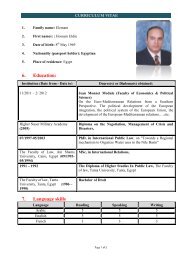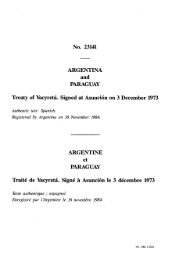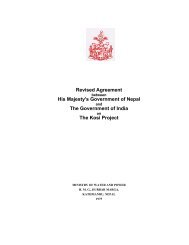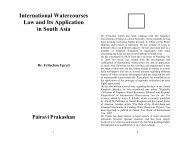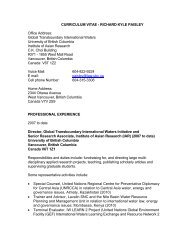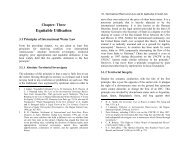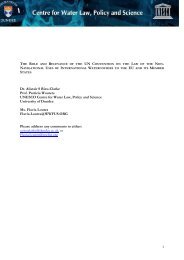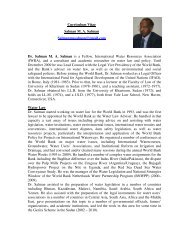Upreti, Trilochan, International Watercourses Law and Its Application ...
Upreti, Trilochan, International Watercourses Law and Its Application ...
Upreti, Trilochan, International Watercourses Law and Its Application ...
You also want an ePaper? Increase the reach of your titles
YUMPU automatically turns print PDFs into web optimized ePapers that Google loves.
Equitable Utilisation / 147 148 / <strong>International</strong> <strong>Watercourses</strong> <strong>Law</strong> <strong>and</strong> <strong>Its</strong> <strong>Application</strong> in South Asiaagreement in conformity with international law. Such anagreement shall be in accordance with equitableprinciples, employing the median or equidistant line,where appropriate, <strong>and</strong> taking into account allcircumstances prevailing in the area of concern.” 130However, following some tension, the proponents of equityfinally prevailed at the Tenth Session. Article 83(1) of theLOSC, when opened for signature in 1982, read:"the delimitation … shall be affected by agreementon the basis of international law… in order toachieve an equitable solution.” 131Since then the ICJ, in deciding cases relating to the continentalshelf <strong>and</strong> its allocation, have gone further than this earlierstance. Equity has become the core rule of LOSC as applied bythe ICJ on issues of equitable delimitation <strong>and</strong> allocation ofresources. This doctrinal shift, in which a remarkable degree ofdiscretion was exercised, can be seen in the case of Tunisia v.Libya <strong>and</strong> will be analysed below. 132 The decision was based onthe equitable principles stating:"the delimitation is to be effected in accordance withequitable principles <strong>and</strong> taking into account of all therelevant circumstances, so as to arrive at an equitableresult. … the area of continental Shelf to be found toappertain to other Party not extending more than 200miles from the coast of the party concerned, no criterionfor delimitation of shelf areas can be derived from theprinciple of natural prolongation in the physicalsense.” 133130 UN conference on the <strong>Law</strong> of the Sea, Draft Convention of <strong>Law</strong> of theSea, 19 ILM, pp. 1129, 1174, July 28-August 29, (1980).131 Ibid.132 ICJ Reports, (1982) pp. 58-62.133 Ibid.In consequence, an equitable result may be arrived at bydrawing, as a first stage in the process, a median line, everypoint of which is equidistant from the low-water mark of therelevant coasts of the disputing parties. The initial line is thensubject to adjustment in light of the above mentionedcircumstances <strong>and</strong> factors. 134In the decision in the Tunisia v. Libya case, the court made aforward leap. It also rejected socio-economic factors indetermining the case. Tunisia’s argument was that Libya earneda huge <strong>and</strong> unfair income from offshore oil. The court refusedthe contention <strong>and</strong> held the view that a “country might be poortoday <strong>and</strong> become rich tomorrow as a result of an event such asthe discovery of a valuable economic resource.” 135In 1984, a case arose concerning the delimitation of themaritime boundary in the Gulf of Maine area, the USA v.Canada, over how to share the benefits of the exclusiveeconomic zone <strong>and</strong> areas beyond in the high seas. In this case,the court ruling on the applicable principles <strong>and</strong> rules ofinternational law states:"no maritime delimitation between states with oppositeor adjacent coasts may be affected unilaterally by anyone of those states. Such delimitation must be sought<strong>and</strong> effected by means of an agreement, followingnegotiations conducted in good faith <strong>and</strong> with a genuineintention of achieving a positive result. Where,however, such an agreement cannot be achieved,delimitation should be effected by recourse to a thirdparty possessing the necessary competence. In eithercase, delimitation is to be affected by the application ofequitable criteria <strong>and</strong> by the use of practical methodscapable of ensuring, with regard to the geographic134 ICJ Reports, (1984) pp. 31-34, para. 76-79.135 ICJ Reports, (1982) pp. 77-78.



